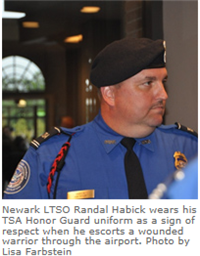
TSA Partners in Support of Nations Veterans

When a wounded U.S. military veteran passes through Newark Liberty International Airport, there is a good chance that Lead Transportation Security Officer Randal Habick of Brick, N.J., is alongside, serving as a personal guide through the airport.
Habick, a former U.S. Army Military Police Officer, joined TSA in 2002 and maintains his connection with fellow veterans by volunteering to provide jet-door-to-curbside service for veterans with severe injuries.
Sometimes the wounded warriors may need a wheelchair or motorized cart, while others are visually impaired. Habick assists those veterans with retrieving their luggage, hailing a cab, locating restrooms, getting a cup of coffee, or even finding a comfortable location to relax during a layover.
Partnering with the Department of Defense Wounded Warrior Program, TSA facilitates the air travel of injured service men and women through the TSA Military Severely Injured Program, which is operated out of Ronald Reagan Washington National Airport.
"TSA employees, like all Americans, value the contributions and great sacrifices our military men and women have made on behalf of making America a safer place," says Daryush "Dar" Mazhari, Manager of TSA's Military Severely Injured Joint Support Operations Center, which operates the Wounded Warrior Program.
The Military Severely Injured Joint Support Operations Center, established in 2005, originally only served Reagan National, Washington Dulles International and Baltimore Washington International Thurgood Marshall airports because of their proximity to major military medical hospitals like Walter Reed and Bethesda Naval Hospital.
Between October 2010 and August 2011, the program handled 3,658 movements of wounded military personnel nationwide, with 972 veterans traveling through Reagan National. Individuals eligible for this program include members from all branches of the armed services who have special travel needs, including their accompanying family members, says Mazhari, who also serves as Stakeholder Manager, Customer Support Quality Improvement Manager and Manager of the Travel Protocol Office at Reagan National.
"TSA provides excellent support to service members and their families, including helping them navigate often difficult and confusing travel and security processes," says Bob Carrington, director of Recovery Care Coordination at the Office of Wounded Warrior Care and Transition Policy with the Department of Defense. "We are pleased to have senior leaders from TSA come present at our Department of Defense-level training each quarter to provide our Recovery Care Coordinators with information about the services and support available from TSA."
The branches of the military refer wounded veterans to TSA to help facilitate a smooth trip through airports. The program office staff arranges a greeting location after receiving a detailed description of the soldier's injuries and trip itinerary. The soldier is then assigned a TSA volunteer escort to help ensure bags are checked properly, transfers go smoothly, and the escort assists the soldier through the checkpoint process.
For assistance through the program, injured service men and women can contact TSA by telephone, email, or fax at least 24 hours before flying. The time allows program staff to contact local TSA officials who then help facilitate the injured service member's screening process.